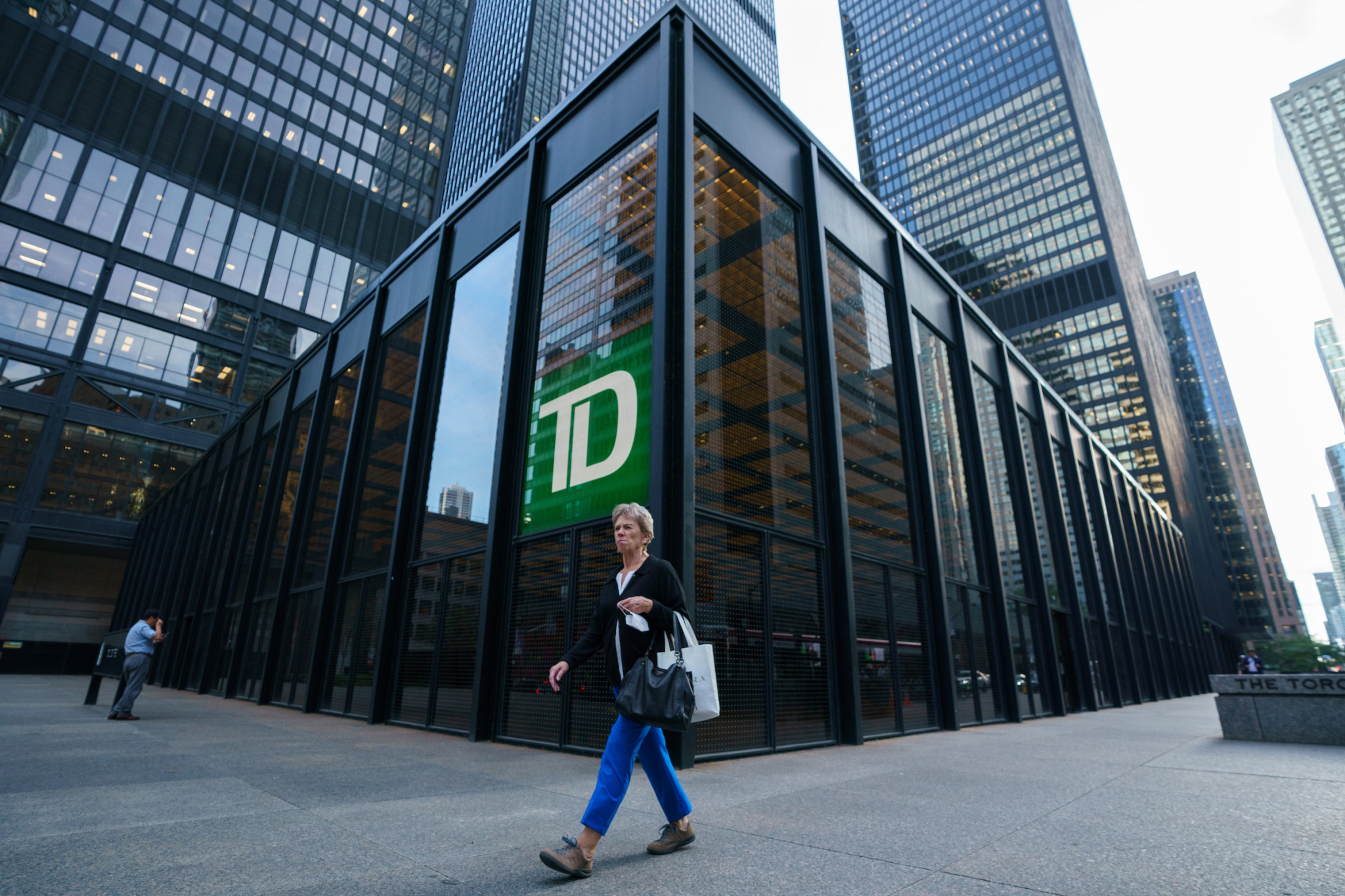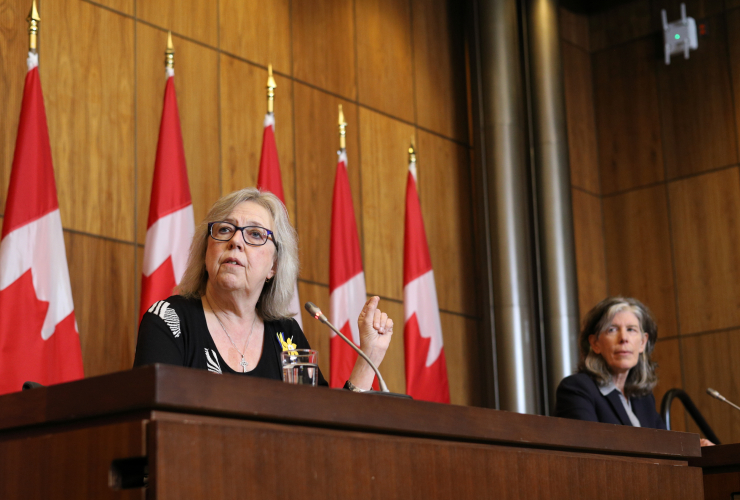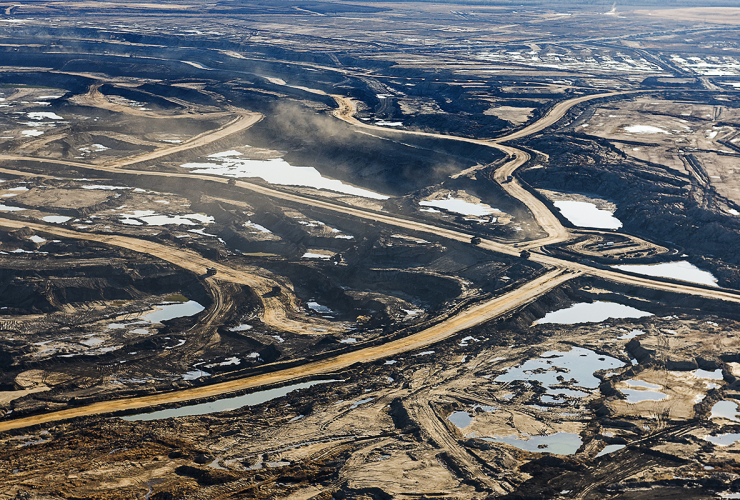For Canada’s biggest banks, annual general meetings — and the pressure they bring from shareholders urging stronger climate action — are officially in the rearview mirror. Not a single proposal was accepted at this year’s AGMs, but the voting results reveal shareholders are increasingly dissatisfied with Canadian banks’ actions not living up to their climate promises.
By the numbers, Canada’s Big 5 banks — RBC, Scotiabank, TD, BMO and CIBC — have financed coal, oil and gas companies to the tune of $1.1 trillion since 2016, when the Paris Agreement came into effect. In 2021, each of those banks signed onto international net-zero banking alliances, promising to bring their greenhouse gas emissions — and the emissions from their banking clients — to net zero by 2050. Despite that promise, Canadian banks have chosen to increase funding to fossil fuel companies expanding their reserves, pushing that net-zero goal further out of reach.
During AGM season, each of the Big 5 banks faced various climate-related shareholder resolutions (details here). For Matt Price, director of corporate engagement with Investors for Paris Compliance, three separate shareholder proposals show pressure is mounting on banks to align their portfolios with credible pathways to net-zero emissions.
One proposal before RBC shareholders, filed by the comptroller of New York City, urged the bank to set and report on goals to reduce its overall emissions by 2030. The idea achieved 17 per cent of the shareholder vote.
A second proposal, filed by the Shareholder Association for Research and Education, would have seen Scotiabank lay out its expectations for transition plans from its high-emitting clients. It drew approximately 25 per cent support.
And a third resolution, filed with TD on behalf of Investors for Paris Compliance and Vancity, asked the bank to create a detailed transition plan for various sectors it has invested in, and received 23.5 per cent support.
Price, whose organization works with financial institutions and shareholders to encourage stronger climate action, told Canada’s National Observer that even though these proposals didn’t secure a majority of the vote, this level of support is indicative of institutional shareholders growing frustrated with banks claiming they will hit net zero without significantly changing their day-to-day operations.
This “should be a wakeup call for the banks,” he said. “We're seeing they're stuck. They're not rolling out the policies that are now needed to tackle their financed emissions, and I think there's a significant chunk of investors who agree with us on that.”
Environmental Defence senior manager for climate finance Julie Segal agreed with Price’s assessment but added regulation is a crucial missing piece.
“The banks are not moving to net zero without regulation, but this trajectory shows the shareholders want them to, so regulation will be well received in a lot of ways,” she said. “In Canada, we're still three to five years behind other countries on regulating the financial sector to align with climate action.”
In its annual risk outlook published this month, the Office of the Superintendent of Financial Institutions (OSFI) said climate change poses a risk to the country’s financial system. The federal regulator for financial institutions says the risks to banks and pension funds come from physical risks, like increased storms damaging infrastructure, as well as transition risks associated with assets, like an oil rig, suddenly losing value through the energy transition.
But Segal says this is an incomplete picture, and OSFI is not recognizing that banks and pension funds, through their investments, are contributing to the climate crisis.
“What I'd like to see from the federal government is an acknowledgment that we have to align the financial sector with climate commitments rather than just looking at how to attempt to insulate the financial sector from climate risks, which is, of course, impossible,” she said.
“If we don't shift the financial sector to align with climate action, then significant losses will happen, and that means that our assets, our investments through banks and pension funds, will be affected.”
Last year, an international academic study traced the ultimate ownership of coal, oil and gas assets and found Canadians, through financial vehicles like pension funds, stand to lose over $100 billion through the energy transition if not prepared for it.
For Segal, regulating the financial sector is part of having a credible climate policy, and she’s not the only one who wants to see OSFI do more.
Canada’s commissioner of the environment and sustainable development, Jerry DeMarco, tabled an audit of OSFI — alongside four other reports detailing forests and climate change, recovery and protection of species at risk and emission-reduction regulations — in Parliament this month. He said those reports show climate change and biodiversity are “intrinsically linked” and that the auditor general’s office had been ringing the alarm bells for years.
“Now, these bells are almost deafening,” he said. “Our past audits show that Canada has failed to meet many of its climate and biodiversity targets, and I’m extremely concerned that without a significant shift in approach, this trend will only continue.”
DeMarco said the regulator was only just beginning to incorporate climate-related financial risks into its risk management system but was still years away from full implementation.
“In addition, OSFI did not view its role as including the advancement of Canada’s broader climate goals,” he said. “There is an opportunity for OSFI to consider how to adapt its role to further Canada’s whole‑of‑government approach to climate change and sustainable development.”
OSFI says it is building its ability to assess climate-related risks and will collect, analyze and disclose climate risk data. That information will help inform a standardized climate test for financial institutions, planned to be rolled out in 2024.
The federal Liberals are
The federal Liberals are fence sitters and tend to walk on two paths at the same time. They are risking injury as the paths diverge and the fence grows higher.
This is the party that embarrassed themselves on the SNC Lavalin file and sacrificed two highly qualified MPs in the process. This is the government that grants export permits for thermal coal shipments from Wyoming to Asia via the Port of Vancouver. Thermal coal is the Godzilla of climate busting materials. This is the government that was too easily played to buy a pipeline and to socialize the cost of climate mitigation by the oil industry by subsidizing unworkable and knowingly infeasible CCS.
Then again, this is the government that brought down the carbon tax and just funded the world's second largest EV and stationary power storage battery plant. It's a disappointing mixed bag with Trudeau.
In the banking sector the economy is seen as separate and superior from environment. But under the unassailable characteristics of the second law of thermodynamics, the environment IS the economy. It's very telling when top financial institutions fail to do their research -- or at least fail to acknowledge their private research results publicly.
This decade will no doubt be a decade of great change when carbon is finally put in its place as a diminishing commodity in favour of low emission electricity. That will happen even without government regulations because low prices are everything to a marketplace.
Electricity seems bound to outcompete fossil fuels very quickly. The issue of creating stranded assets is real. The 20th Century is still very much the current calendar in the policy boardrooms of the Big 5. It's possible that bank profits could turn down on a dime. Several questions will probably bubble to the surface them, top among them being: Whose fault is that?
Let's hope government stays out of their financial straits if it comes to losing several hundred billion on failed carbon projects merely by failing to practice due diligence.






Comments